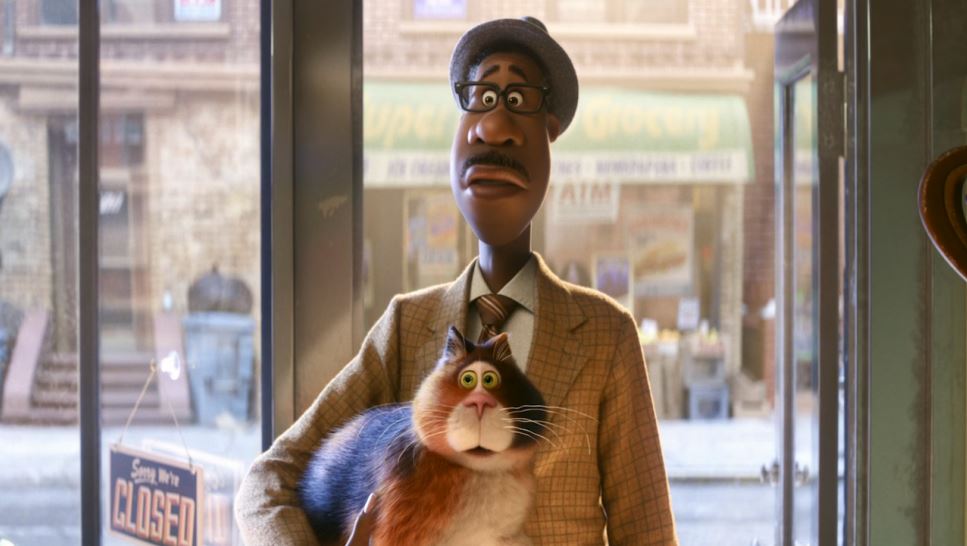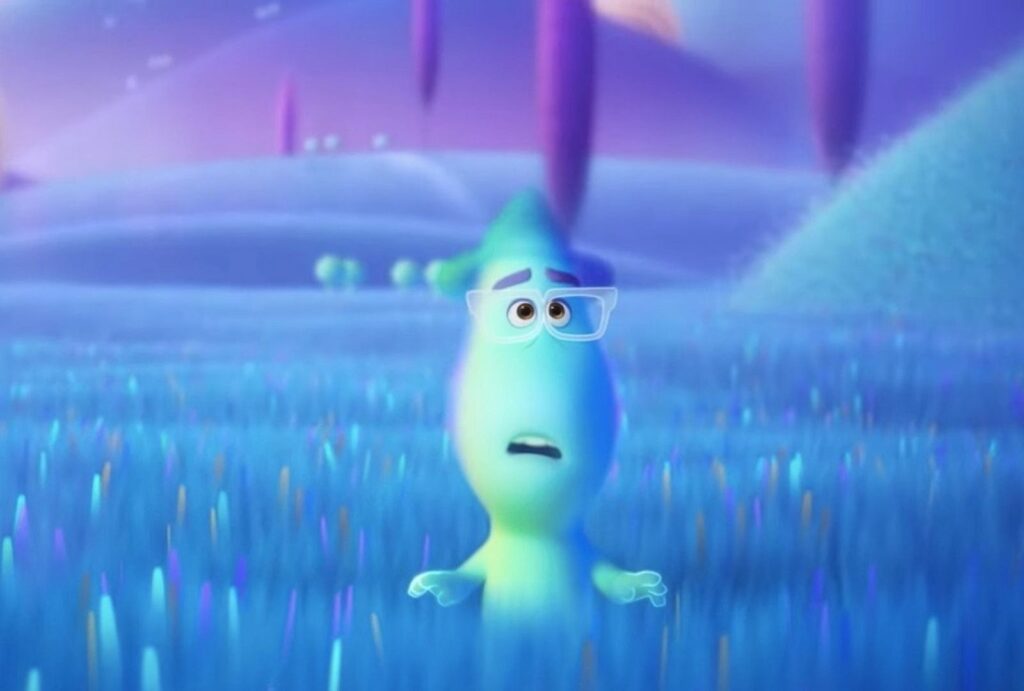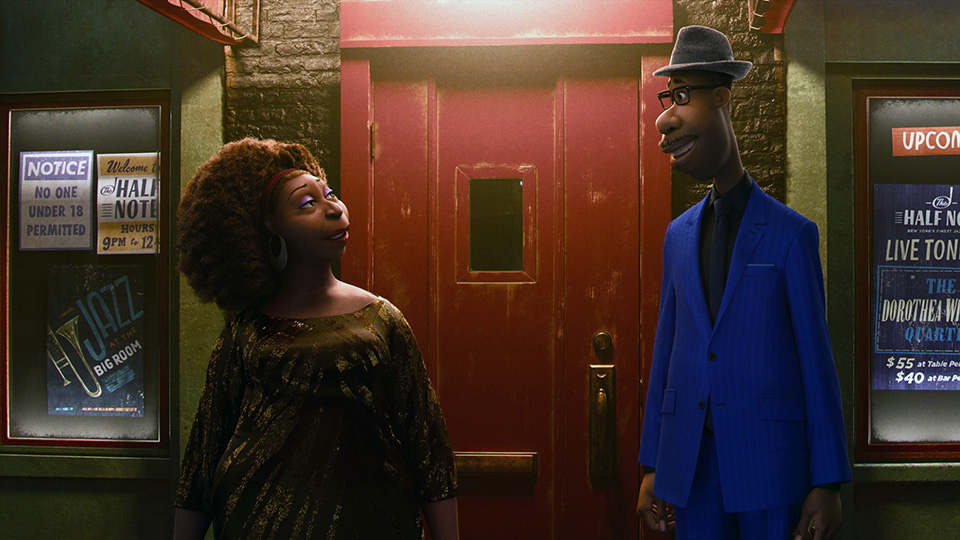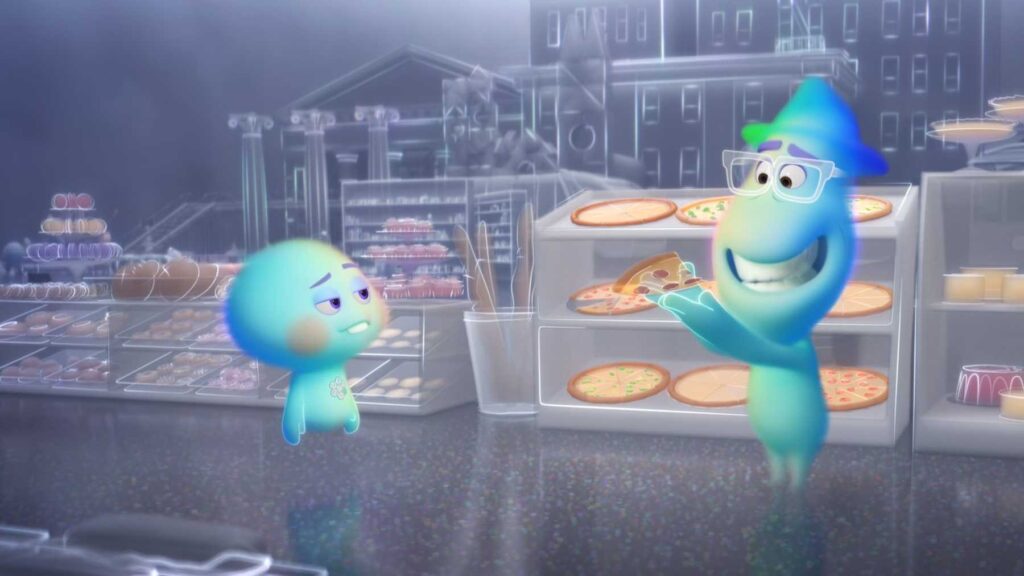
There may not be a venue explicitly called Imagination Land in Pete Docter’s latest feature, but there’s still plenty of innovation and ingenuity. Soul, the new movie from the Pixar standout, is another triumph, an inspired mix of vibrant animation, rich storytelling, and powerful themes. It asks big, probing questions—about life and death, art and commerce, work and pleasure—while also making generous room for ticking-clock suspense and broad comedy. This is a sweeping metaphysical adventure tale, complete with fart jokes.
The signature achievement of Soul is its conception of the Great Before, a vast supernatural laboratory of sorts where human personalities are forged before birth. Advancements in technology have allowed animators to pack the frame with infinite minutiae, but Docter’s approach here is spare and restrained. The realm he’s conceived is gently pastoral, a luminous land of rolling hills, peaceful meadows, and placid lakes. The blue-and-purple color scheme is similarly serene, smoothly shifting between various hues of turquoise and lavender. And the world’s essential openness—its sense of being permanently incomplete—feels not like a failure of vision, but like a gift from creator to viewer. Some fictional environments are overwhelming in their detail. Docter lets you fill in the blanks.
Our point of entry into this mystical netherworld is Joe (voiced by Jamie Foxx), a middle school music teacher who longs for his shot on the big stage. He gets it when he snags an audition alongside jazz icon Dorothea Williams (Angela Bassett) at a swanky club called the Half Note. A gifted pianist, Joe lands the gig; he’s so elated that he’s walking on air, until he’s falling down a manhole.

Is he dead? Not exactly. With his body in a coma, Joe’s essence—taking the form of a glowing cyan humanoid, topped off with spectacles and a fedora—plummets into the Great Before, which proves to be less a paradisiacal playground than an elaborate preschool, housing patient teachers, bubbly students, and cranky bureaucrats. Docter, who wrote the script with Mike Jones and co-director Kemp Powers, likes to get his exposition out of the way early—recall Amy Poehler’s opening voiceover in Inside Out—and with the help of a spectral presence named Jerry (Alice Braga), he quickly explains the rules and provisos of this peculiar universe. In short, thanks to some mistaken identity, Joe finds himself linked to 22 (Tina Fey), an impudent soul whose blobby body is a cross between a Pac-Man ghost and a tooth from a pediatric dentist’s brochure. 22’s abiding apathy has prevented her from being transplanted into an earthly shell; together, she and Joe begin the perilous, not entirely intentional process of returning his own soul to his corporeal self.
This means that Soul is, in its broadest strokes, a buddy comedy. It chronicles two headstrong personalities working at cross-purposes; Joe is hell-bent on restoring the status quo so that he can perform with Dorothea and fulfill his lifelong dream of becoming a professional musician, while 22 is more invested in discovering her own purpose or spark, something that’s long eluded her. (An amusing flashback runner features 22 infuriating some of history’s most treasured figures with her indifference and self-absorption; cue Copernicus shouting, “The world doesn’t revolve around you!”) What follows is somewhat predictable in its overall trajectory—Joe inevitably teaches 22 about the pleasures and the pitfalls of the human condition, while uncovering a few truths about himself in the process—but whimsical in its particulars, incorporating jaunty slapstick, fish-out-of-water humor, and a very frustrated therapy cat.

The results aren’t always uproarious; despite its considerable intelligence and ambition, Soul is far from the funniest movie in the Pixar canon. But it’s a nervier picture than it first appears. Joe, its nominal hero, ends up revealing himself as its most flawed and deluded character. (The closest thing the film has to an actual villain is Terry, an officious accountant voiced by Rachel House who’s obsessed with maintaining order; her scenes, some of which take place in an enormous ethereal server farm, are where Trent Reznor and Atticus Ross’ slippery score asserts itself most notably.) A thoughtful teacher who encourages one of his more talented students, Joe can nevertheless be self-centered and fanatical. He chafes at his mother (Phylicia Rashad) for failing to embrace his musical aspirations, yet he fails to appreciate her genuine protective interest in his welfare; he routinely visits a gregarious barber (Donnell Rawlings), yet he never shows any interest in the man’s personal life.
The concept of an imperfect protagonist gradually bettering himself predates Dickens, but Soul is bracing in how it articulates its themes of self-discovery and enlightenment. Joe is convinced that he has all the answers; 22 is equally convinced that she has no use for any of them. In its final act—the second straight strong finish from Pixar—the movie upends their assumptions in ways that are surprising and powerful, as well as visually enchanting and narratively exciting. (Many children’s films include their share of wacky references, but only Pixar could incorporate a parable from David Foster Wallace.)

It’s fair to call Soul didactic, but its heart is too pure for it to feel preachy or sanctimonious. And while its earnest introspection may puzzle young children, it’s nevertheless invigorating to watch an animated movie wrestle seriously with existential questions—why are we here? what are we meant to do?—that will likely prompt valuable conversations between kids and adults.
Or maybe they—OK, we—will just be happily distracted by the lustrous colors, the physical hijinks, and the engrossing story. That’s fine, too. One of the insights of Soul is that people are rarely defined by any particular quality. Neither are movies. Docter’s feat here lies in the way he deftly marries the eye-catching and the thought-provoking, without constructing a clumsy binary in the process. Among the film’s many imaginative concepts is The Zone, an intangible place that Joe unwittingly transports himself to whenever he loses himself in his music. As one character later points out, there’s a thin line between the temporary rapture of The Zone and the permanent dislocation of obsessive madness. That’s a scary idea, but don’t worry. In a movie as sweet and smart and joyful as this, no soul is ever truly lost.
Grade: A-
Jeremy Beck is the editor-in-chief of MovieManifesto. He watches more movies and television than he probably should.
